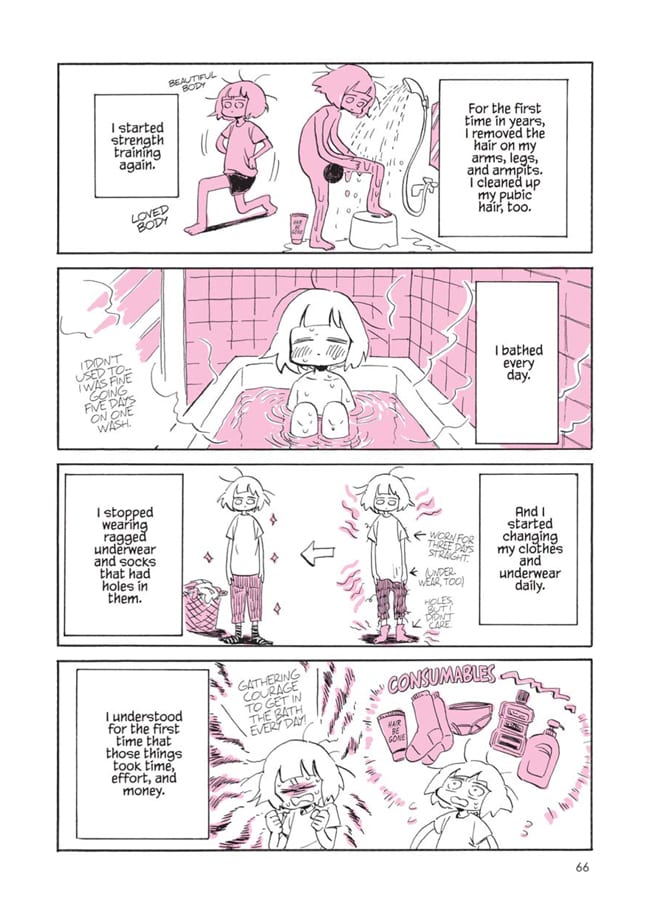Kabi Nagata’s My Lesbian Experience with Loneliness follows the painfully shy, socially anxious narrator Kabi through her first sexual encounter at age 28, for which she hires a female sex worker to meet her in a love (or short-stay) hotel. The book traces themes of emotional distancing in Kabi’s life, primarily her abstinence from most social interaction and sexual expression, as she arguably displaces the drive for intimacy into pursuing her ambition of becoming a manga artist. Kabi’s wires crossing also causes her to project an artificial intimacy on the titular encounter, which ultimately leaves her overwhelmed and uncertain of how to process the exchange. For Kabi, it’s less about experiencing the sensations of a sexual encounter with another person, and more about driving herself to have checked off certain notches in a sexual narrative (i.e., was I kissed, was I embraced, was I penetrated?). My Lesbian Experience with Loneliness itself may suffer a similar issue: in an almost desperate attempt to assemble all the blocks of Kabi’s story, the comic displaces its own need to find aesthetic purpose.
Nagata takes great pains to deliver her story in detail: she explains the entire chronology of working her way into becoming a manga artist, including details of the tasks she had at various bakery jobs, her personal hygiene and sleeping habits, compulsions including eating disorders and cutting, histories of relationships with each immediate family member, etc. Seemingly in fear of being misunderstood, at times the pages become walls of text, as Kabi goes through every minutia of a day, using the visual shorthand of chibi characters and expressions to convey feelings and emotion. Similar to Moyoco Anno’s autobiographical Insufficient Direction, in which Anno portrays the intimacies (and lack thereof) in her relationship with partner Hideaki Anno, the focus is less on connecting with emotions and more on hitting the signifiers around the emotions: we can read when Kabi is dismayed, disgusted, or numb very easily, but understanding each expression’s catalyst is more difficult. As a result, the underpinnings behind the narrator’s quirks and anxieties never quite come to light. While Anno is able to transcend this discrepancy by injecting humor and her iconic style to her story, Nagata can’t find a suitable bridge to mend the gap between the story of her experience and aesthetic: her style can read as generic and her tone never quite finds its mark.

That’s not to say there aren’t incredibly affecting moments. A panel that stands out in My Lesbian Experience finds Kabi pulling a brick of uncooked ramen away from her mouth. Crazed and starved from restrictive eating, she’s torn into it so furiously that when she stops feeding she’s left specks of blood from her torn-up gums on the hard, raw noodles. It’s a moment of true horror, and its framing shows the denial Kabi feels with her drives and needs. Another standout theme is in Kabi’s obsessing over every (seeming) benevolence shown to her: she seems especially amazed by the patience and friendliness shown by the sex worker she’s hired. This acknowledgment feels significant, as the concepts of emotional labor and deep acting are current topics of understanding modern labor, particularly as stereotypically female jobs require this form of emotional intelligence. But Kabi’s understanding of the situation only recognizes this as “kindness,” not a necessary performative skill; again, falling just short of an understanding of reality.

This is not all to negate the value of My Lesbian Experience: this is a comic that (a) treats sex workers with dignity and agency in a medium which has been historically unkind, (b) addresses very real themes of self-harm in a direct and honest way, and (c) adopts an attitude of complete acceptance of sexuality fluidity. But as in Kabi’s sexual encounter: satisfaction doesn’t come from setting up equations or crossing off notches. It’s the experience, and what it brings out, that counts.







